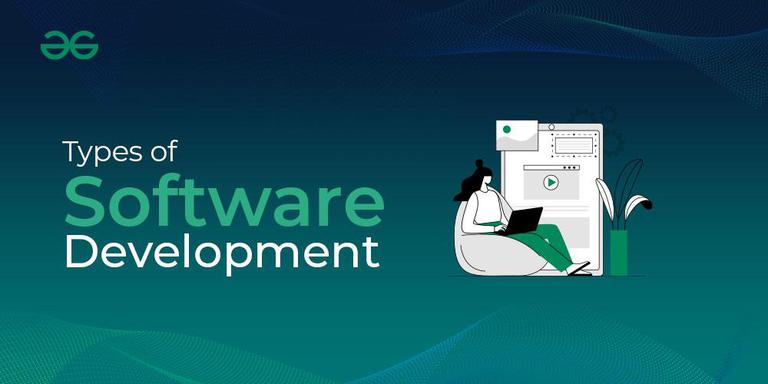12 Most Popular Types of Software Development [2023]
Software development is defined as the process of designing, creating, testing, and maintaining computer programs and applications. Software development plays an important role in our daily lives. It empowers smartphone apps and supports businesses worldwide.
Software development encompasses various types and methodologies, each tailored to address specific challenges and requirements.
Here are some prominent types of software development:
Table of Content
- 1. Web Development:
- 2. Mobile App Development:
- 3. Desktop Application Development:
- 4. Game Development:
- 5. Embedded Systems Development:
- 6. Data Science and Machine Learning:
- 7. DevOps Engineer:
- 8. Blockchain Development:
- 9. AR/VR Development:
- 10. Cloud Computing:
- 11. Cybersecurity:
- 12. Artificial Intelligence (AI):

Types of Software Development
1. Web Development:
- Introduction:Web development involves creating dynamic and interactive websites or web applications.
- Languages:
- Frontend: HTML, CSS, JavaScript
- Backend: JavaScript (Node.js), Python (Django, Flask), Ruby (Ruby on Rails), PHP
- Frontend: React, Angular, Vue.js
- Backend: Express.js (Node.js), Django (Python), Ruby on Rails (Ruby), Laravel (PHP)
2. Mobile App Development:
- Introduction:Mobile app development focuses on creating applications for smartphones and tablets.
- Languages:
- iOS (Apple): Swift, Objective-C
- Android: Java, Kotlin, Flutter (Dart)
- iOS: SwiftUI, UIKit
- Android: Android SDK, Flutter, Xamarin
3. Desktop Application Development:
4. Game Development:
- Introduction:Game development focuses on designing and creating video games for various platforms.
- Languages:
- Unity (cross-platform): C#, UnityScript
- Unreal Engine: C++
- GameMaker: GML (GameMaker Language)
- Unity: Unity Engine
- Unreal Engine: Unreal Engine
5. Embedded Systems Development:
- Introduction:Embedded systems development involves creating software for microcontrollers and devices with specific functions.
- Languages:
- C, C++: Widely used for their efficiency and low-level capabilities.
- Arduino: For simplified embedded development
6. Data Science and Machine Learning:
- Introduction:Data science and Machine learning involve analyzing data and building intelligent models.
- Languages:
- Python: NumPy, Pandas, Scikit-learn, TensorFlow, PyTorch
- R: Especially for statistical analysis
- TensorFlow, PyTorch: Deep learning frameworks
- Scikit-learn: Machine learning in Python
7. DevOps Engineer:
- Introduction:DevOps focuses on collaboration between development and operations teams for efficient and continuous delivery.
- Languages:
- Bash/Shell Scripting: For automation
- Python, Ruby: Scripting and automation tasks
- Jenkins, Travis CI: Continuous integration
- Docker, Kubernetes: Containerization and orchestration
8. Blockchain Development:
- Introduction:Blockchain development involves creating decentralized applications (DApps) and smart contracts on blockchain platforms.
- Languages:
- Solidity: For Ethereum smart contracts
- Rust, Go: For some blockchain platforms
- Truffle: Ethereum DApp development framework
9. AR/VR Development:
10. Cloud Computing:
- Introduction:Cloud computing involves developing applications that leverage cloud services for storage, computing, and networking.
- Languages:
- Python, Java, C#: Commonly used for cloud-based applications
- JavaScript: Especially for serverless computing
- Amazon Web Services (AWS), Microsoft Azure, Google Cloud Platform (GCP): Cloud service providers with various frameworks and tools
11. Cybersecurity:
- Introduction:Cybersecurity development focuses on building secure systems and applications to protect against cyber threats.
- Languages:
- Python, C, C++: Often used for security tools and systems programming
- Metasploit: Penetration testing framework
- OpenSSL: Cryptography library
12. Artificial Intelligence (AI):
- Introduction:AI development involves creating intelligent systems that can learn and make decisions.
- Languages:
- Python: TensorFlow, PyTorch, scikit-learn
- Java: Deeplearning4j
- TensorFlow, PyTorch: Deep learning frameworks
- scikit-learn: Machine learning in Python
These are general overviews, and the specific frameworks chosen can vary based on project requirements, developer preferences, and industry trends. The field of software development is dynamic, and new frameworks and languages emerge over time.


